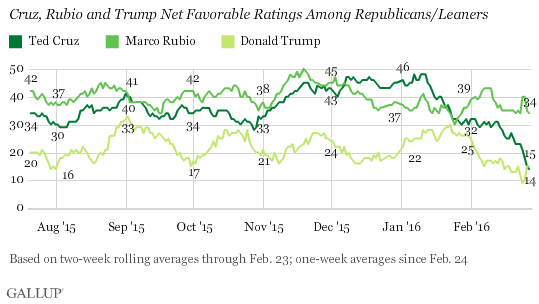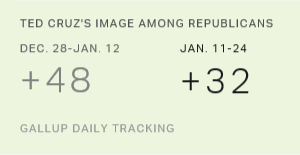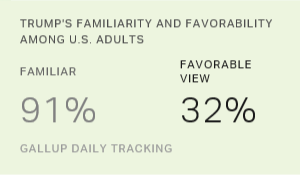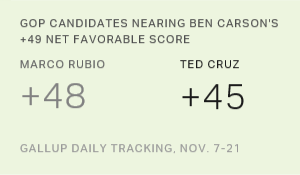Story Highlights
- Cruz's image among GOP has fallen more than any GOP candidate
- Rubio remains far more popular than Trump, Cruz
- Trump's popularity among Republicans is near his campaign low
PRINCETON, N.J. -- Ted Cruz's and Donald Trump's images among Republicans have dropped to all-time lows in recent days as exchanges between the Republican presidential candidates have turned highly negative and personal. Cruz's net favorable rating among Republicans is now +14, his lowest to date and essentially the same as Trump's +15. Marco Rubio's image is less positive than it has been at previous points in the campaign, but at +34, it is the same as in early January. Rubio's net favorable score is now twice as high as the scores of either of his major two competitors.

The net favorable ratings Republicans and Republican-leaning independents give to Cruz, Trump and Rubio are all at or near their lowest since tracking began, underscoring the clear toll the campaign has apparently taken on how Republicans view these contenders. The latest update comes from Gallup polling conducted Feb. 21-27. During this time, the leading Republican candidates intensified their rhetoric against one another, including at the 10th Republican debate on Feb. 25 and at a Trump campaign event on Friday during which New Jersey Gov. Chris Christie endorsed Trump.
Ted Cruz
- Cruz registered his campaign's highest net favorable score (+48) among Republicans and Republican leaners in late December, but his image has soured since. His current score of +14 is the lowest since Gallup began tracking images in July. Cruz, who has come under attack by not only Trump and Rubio, but also by GOP candidate Ben Carson for his perceived use of underhanded campaign tactics, has seen his popularity drop farther than any other GOP candidate in 2016.
- Cruz's image has worsened across most groups of Republicans when compared with his standings in the first two weeks of this year. Only among "very conservative" and highly religious Republicans is Cruz's level of popularity roughly where it was in the first two weeks of January.
- Cruz continues to have a more positive image among men than among women, among core Republican identifiers than among independents who lean Republican, and among conservative Republicans. (He has a net negative score among moderate/liberal Republicans.)
- Cruz is more popular among those with at least some college education, and those who are highly religious (with a negative net favorable score among those who are not religious).
Donald Trump
- Trump has long been relatively unpopular among national Republicans, and his average net favorable score of +22 in the nine months Gallup has been tracking images is well below Rubio's or Cruz's average over the same period.
- Trump's net favorable rating with Republicans reached +9 for the seven days ending Feb. 24, its lowest point since tracking began, before edging back to his current +15.
- Trump's highest net favorable rating during the campaign was +33, registered in late August and early September.
- Among Republicans, Trump is viewed most positively by men, those aged 55 and older and those with some college education but no degree. He is viewed more negatively than positively by women, 18- to 34-year-olds and those with a postgraduate education.
Marco Rubio
- Though yet to finish first in any primary contest, Rubio is the most popular of the three major candidates among national Republicans. His current net favorable score of +34 is more than twice that of either Cruz or Trump. Rubio began the year with a +34 net favorable, identical to his current rating.
- Rubio's average net favorable score of +40 since tracking began is higher than the average of either of the other top two candidates.
- Rubio's most positive net favorable score was +50, reached in mid-November. This marked the second-highest net favorable score earned by any of the 17 candidates Gallup has measured -- behind only the scores in the 50-point and 60-point range registered by Carson in the late summer and early fall.
- Rubio's image skews highest among Republican identifiers, conservative Republicans, those with a college education and those who are highly religious. His biggest improvement this year has been with Republican women, who now give him a net favorable score about nine points higher than he received earlier this year.
Implications
While there has been no shortage of unflattering remarks throughout much of the GOP campaign, the increased amount of personal attacks and insults over the past week likely have negatively affected both Cruz's and Trump's images, although the latter's image has recovered slightly in recent days. Cruz is less well-liked by Republicans and Republican-leaning independents than at any point since Gallup tracking began nine months ago. Rubio maintains a considerably more positive image than either Trump or Cruz, but his net favorable rating is lower than it has been at previous points in the campaign.
Republicans' much more favorable image of Rubio than of Trump or Cruz has not translated into first-place finishes in primary contests so far for the Florida senator. This may partly reflect that Trump's appeal is not based on his being likable or personable, but rather on his rough, critical and reaction-generating persona. As was on display this past Friday, Rubio has made the decision to emulate that more negative, baiting style associated with Trump. Undoubtedly, this is a risk for Rubio. He could hurt his own image more than Trump's by engaging in this type of dialogue. But given Trump's impressive performance thus far in the primaries, Rubio and his advisers may think this is his best gamble to wrestle the lead from the current front-runner.
Historical data are available in Gallup Analytics.
Survey Methods
Results for this Gallup poll are based on telephone interviews conducted on a continuous basis on the Gallup U.S. Daily survey. The latest update used in this report is based on interviewing conducted Feb. 21-27, 2016, with random samples of between 754 and 810 Republicans and Republican-leaning independents, aged 18 and older, living in all 50 U.S. states and the District of Columbia, rating each of the three candidates. For results based on the total sample of Republicans, the margin of sampling error is ±4 percentage points at the 95% confidence level. All reported margins of sampling error include computed design effects for weighting.
Each sample of national adults includes a minimum quota of 60% cellphone respondents and 40% landline respondents, with additional minimum quotas by time zone within region. Landline and cellular telephone numbers are selected using random-digit-dial methods.
Learn more about how the Gallup U.S. Daily works.


